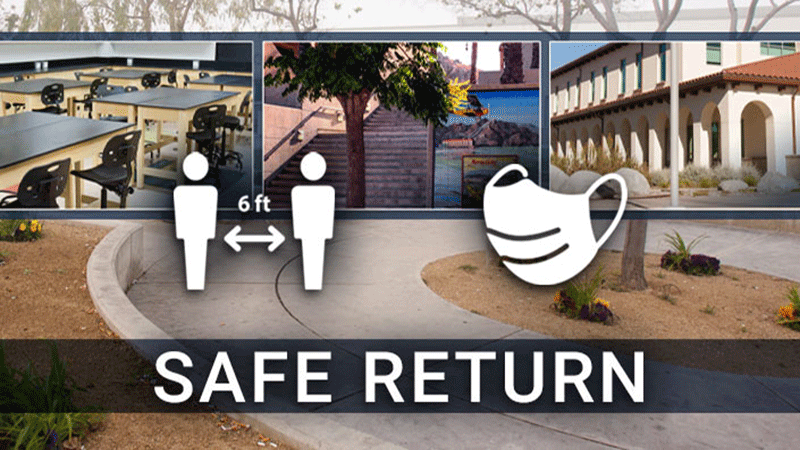Closed since March 16, the Riverside Community College District has begun to formulate
a plan in order to return to traditional education delivery. In May, the District
convened a Safe Return Taskforce with leadership from Moreno Valley College, Norco
College and Riverside City College along with faculty, staff, students and administrators
throughout the District. The taskforce was charged with developing recommendations
for restoring on-site operations while ensuring the safety of students and employees.
The recommendations of the taskforce have been organized into phases and are compliant
with the California Resilience Roadmap: Stages 1-4 as well as specific county health
department directives. The recommendations also consider the unique environments and
educational programs of each college.
The District and its college have also sought the assistance of Riverside County leadership,
so that a number of essential work force led programs could return to face-to-face
instruction. Some of the programs include nursing, certified nursing assistant, dental
hygiene, dental assistant, paramedics, EMTs, firefighting, peace officers, corrections
academy, dispatch academy, culinary academy, and other STEM and STEM based CTE programs
that contribute to the preparation of essential workers that are vital for the economic
recovery of our county.
“We are prioritizing the restoration of educational programming and organizational
functions that are in line with or directly connected to essential sectors of the
California economy as defined in Governor Newsom's March 19 order and refined in April,”
said Wolde-Ab Isaac, Ph.D., chancellor, RCCD. “Courses and programs that prepare students
for jobs in essential sectors will be taught in hybrid format with lectures online
and clinical/labs to be conducted in-person.”
Courses from this past spring semester and the current summer term that required face-to-face
labs, skills development, and testing will reconvene for a special session. This will
allow students to complete course requirements in the summer and fall, Isaac said.
Sessions will follow the CA Stage 2 guidelines.
Currently, the colleges are in Phase A or CA Stage 2 for the summer term that started
on June 22 and concludes on July 31. Although the campuses are closed, instruction
has continued online. Campus facilities continue to receive thorough cleaning in anticipation
of some courses returning to campuses.
For the fall semester (August 24 to December 16), the District is recommending Phase
B or CA Accelerated Stage 2. While instruction would remain online, Phase B in August
does offer District and college personnel to return to campus in order to handle essential
services that cannot be conducted online. Currently, financial aid, counseling, tutoring
and other student support programs remain available. Students are able to continue
their education and prepare for graduation during the pandemic.
For the winter term (January 4 to February 11), the District’s Phase C or CA Stages
2 – 3 plan includes continuing most courses online, with some courses that require
face-to-face labs, skills development, and testing being offered in a hybrid format.
The recommendations will be further developed as the conditions and status of the
COVID-19 pandemic are better understood, closer to the term’s start date, Isaac said.
Next year’s spring term (February 16 to June 1) anticipates moving into Phase D based
on the assumption that the state has reached Stage 3 of the California Resilience
Roadmap and providing county health directives allow the reopening of college campuses.
State guidelines of social distancing, personal protection (washing/sanitizing hands,
wearing masks and gloves), and thorough cleaning of facilities, will continue to be
followed until CA Stage 4 is reached and those guidelines and directives are lifted
at the conclusion of the Stay Home Order, Isaac added.
As the recommendations evolve and plans are finalized, announcements will be made
on the District and college websites. RCCD’s COVID-19 Information web page will be
updated with communications and resources. A new SAFE RETURN web page is also accessible
with updated recommendations and information as each new term begins.
Throughout the different phases of reopening and stages of the pandemic, students
will continue to have equitable access to essential student services either online,
or when it is safe on campus,” Isaac said.
